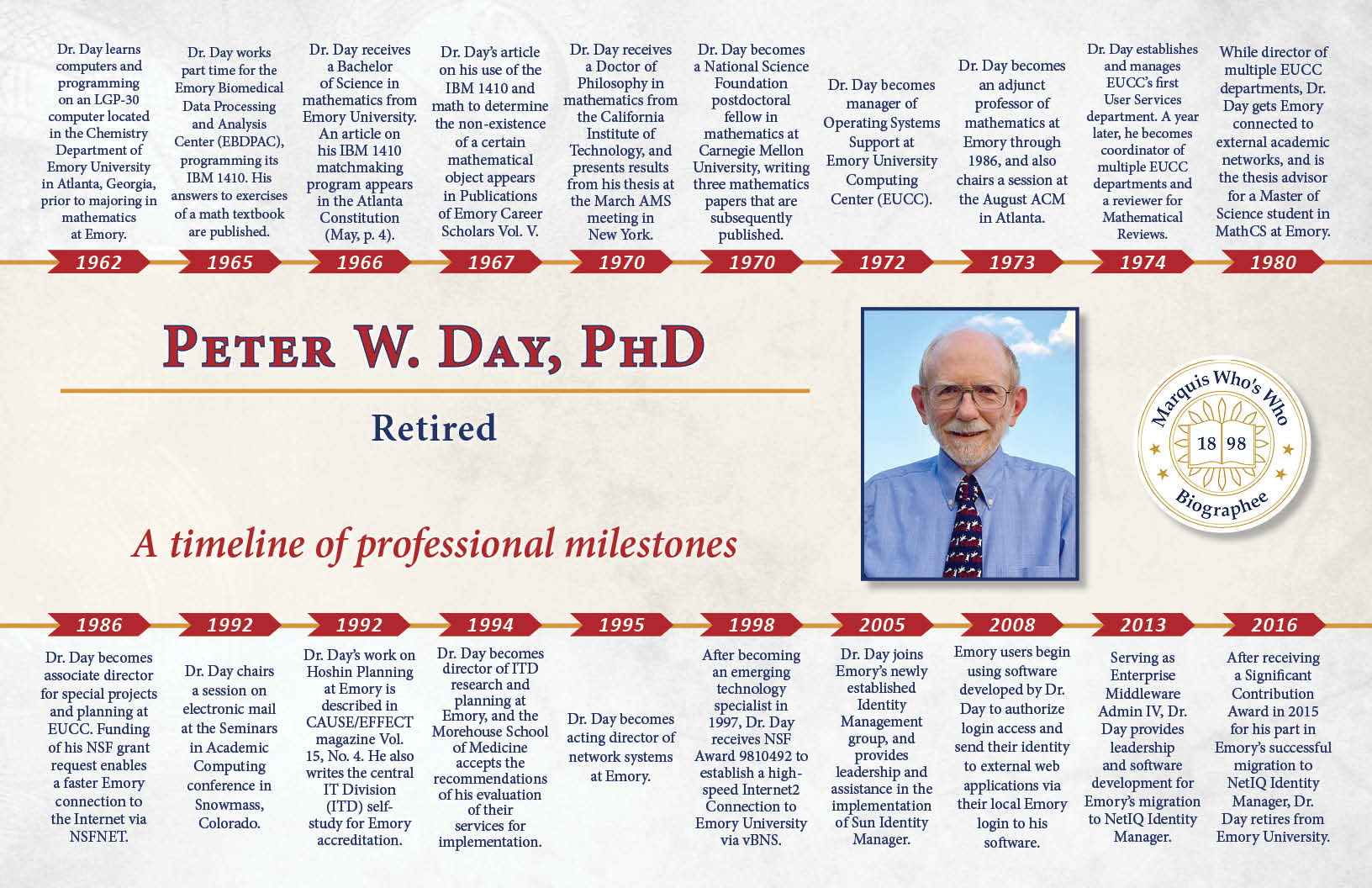1962
Dr. Day learns computers and programming on an LGP-30 computer located in the Chemistry Department of Emory University in Atlanta, Georgia, prior to majoring in mathematics at Emory.
1965
Dr. Day works part time for the Emory Biomedical Data Processing and Analysis Center (EBDPAC), programming its IBM 1410. His answers to exercises of a math textbook are published.
1966
Dr. Day receives a Bachelor of Science in mathematics from Emory University. An article on his IBM 1410 matchmaking program appears in the Atlanta Constitution (May, p. 4).
1967
Dr. Day’s article on his use of the IBM 1410 and math to determine the non-existence of a certain mathematical object appears in Publications of Emory Career Scholars Vol. V.
1970
Dr. Day receives a Doctor of Philosophy in mathematics from the California Institute of Technology, and presents results from his thesis at the March AMS meeting in New York.
1970
Dr. Day becomes a National Science Foundation postdoctoral fellow in mathematics at Carnegie Mellon University, writing three mathematics papers that are subsequently published.
1972
Dr. Day becomes manager of Operating Systems Support at Emory University Computing Center (EUCC).
1973
Dr. Day becomes an adjunct professor of mathematics at Emory through 1986, and also chairs a session at the August ACM in Atlanta.
1974
Dr. Day establishes and manages EUCC’s first User Services department. A year later, he becomes coordinator of multiple EUCC departments and a reviewer for Mathematical Reviews.
1980
While director of multiple EUCC departments, Dr. Day gets Emory connected to external academic networks, and is the thesis advisor for a Master of Science student in MathCS at Emory.
1986
Dr. Day becomes associate director for special projects and planning at EUCC. Funding of his NSF grant request enables a faster Emory connection to the Internet via NSFNET.
1992
Dr. Day chairs a session on electronic mail at the Seminars in Academic Computing conference in Snowmass, Colorado.
1992
Dr. Day’s work on Hoshin Planning at Emory is described in CAUSE/EFFECT magazine Vol. 15, No. 4. He also writes the central IT Division (ITD) self-study for Emory accreditation.
1994
Dr. Day becomes director of ITD research and planning at Emory, and the Morehouse School of Medicine accepts the recommendations of his evaluation of their services for implementation.
1995
Dr. Day becomes acting director of network systems at Emory.
1998
After becoming an emerging technology specialist in 1997, Dr. Day receives NSF Award 9810492 to establish a high-speed Internet2 Connection to Emory University via vBNS.
2005
Dr. Day joins Emory’s newly established Identity Management group, and provides leadership and assistance in the implementation of Sun Identity Manager.
2008
Emory users begin using software developed by Dr. Day to authorize login access and send their identity to external web applications via their local Emory login to his software.
2013
Serving as Enterprise Middleware Admin IV, Dr. Day provides leadership and software development for Emory’s migration to NetIQ Identity Manager.
2016
After receiving a Significant Contribution Award in 2015 for his part in Emory’s successful migration to NetIQ Identity Manager, Dr. Day retires from Emory University.

